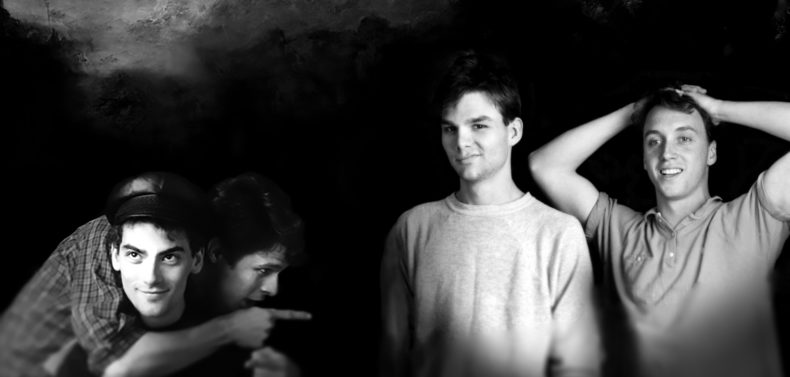With da Vinci’s words in mind, “Art is never finished, only abandoned,” Love Tractor’s eponymous first album from 1982—an instrumental art-rock gem that cemented Lamar Dodd students Mark Cline, Mike Richmond and Armistead Wellford as pioneers of the Athens music scene—can be reinterpreted as a living, evolving work. Nearly 40 years after its initial release, the self-titled album has been remixed at Chase Park Transduction by David Barbe and Bill Berry. Landing Nov. 6 on all formats via Happy Happy Birthday to Me Records, Love Tractor features revamped album artwork by the band’s members, plus liner notes from friends and musical contemporaries Mike Mills of R.E.M and Kate Pierson of The B-52’s.
In anticipation of the reissue, an exclusive Record Store Day 7”—slated for Oct. 24, the third and final RSD of 2020—will feature two reimagined songs from the original recording session: “60 Degrees and Sunny” and “FESTI-vals,” which you can hear today.
Below, Love Tractor guitarist Mike Richmond describes the story of how “Festival” became “FESTI-vals.”
“Festival” and “FESTI-vals”
“Festival” is one of the earliest songs written by Love Tractor, and it is also one of my favorite songs on our first album. It begins with Mark’s guitar line, which is very repetitive and somewhat reminiscent of Robert Fripp’s playing, and also other things that we were listening to at the time, such as Phillip Glass, Kraftwerk, NEU! and John Foxx (Metamatic), among others.
To break the hypnotic front section of the song, the middle passage features a dramatic, cinematic break where the song moves a half step up, keyboards come in driving and building the song to a satisfying crescendo—and then quickly, the song goes back to the initial repetition.
The song would lack all definition if not for Armistead’s fat, pulsing bass, which adds clarity and movement to the repetitive sections of the song. His performance is literally the underpinning that orchestrates all the movement in the song.
I would call “Festival” a drama sandwich—a lot of meaty, spicy drama sandwiched between two slices of comforting Sunbeam Bread, with some mayo oozing out the sides.
On top of Mark’s repetitive guitar line, my guitar goes on a different kind of journey. I usually play the lead melodies on Love Tractor’s first album, but here I play minimal but well-placed chords over Mark’s repetitive bed. So, in a way the chords are the lead instrument on “Festival.” I begin and end the song with an alternating C–Em pattern. Towards the end of the song, I drop into what I call a “Free Jazz Solo.” The solo was impromptu, unrehearsed and accomplished in one take. For years, I had no idea what I had actually played in the “Free Jazz Solo,” and never tried to duplicate it live. For our more recent shows, I went back and relearned it as close as I could, and now when we play “Festival” live, I attempt the “Free Jazz Solo.”
For the rerelease of our eponymous first album, we did a special mix of “Festival” (along with two other special mixes of “Sixty Degrees Below” and “Seventeen Days”), renaming it “FESTI-vals,” a liberal play on the etymology of the word “festival.”
Our goal in the special mix(es) was to emphasize the drama and repetition in the chosen songs as well as promote other discoveries that came from years of performing the songs. In “FESTI-vals” there is a percussive flute (yes, flutes!) intro over the guitars that is a quote from Phillip Glass’ opera Einstein on the Beach—not a literal quote, but a musical paraphrase. We also wanted to step up the drama in the middle of the song—as we had performed it live.
Something of importance is the nonstop “4 on the floor” beat. Yup, “Festival” is a dance song!
Like what you just read? Support Flagpole by making a donation today. Every dollar you give helps fund our ongoing mission to provide Athens with quality, independent journalism.









